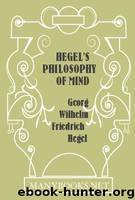Hegel's Philosophy of Mind by Georg Wilhelm Friedrich Hegel

Author:Georg Wilhelm Friedrich Hegel
Language: eng
Format: mobi
Published: 2012-03-23T06:21:32.939032+00:00
* * *
(b) The Feeling Soul.--(Soul as Sentiency.)(122)
§ 403. The feeling or sentient individual is the simple "ideality" or subjective side of sensation. What it has to do, therefore, is to raise its substantiality, its merely virtual filling-up, to the character of subjectivity, to take possession of it, to realise its mastery over its own. As sentient, the soul is no longer a mere natural, but an inward, individuality: the individuality which in the merely substantial totality was only formal to it has to be liberated and made independent.
Nowhere so much as in the case of the soul (and still more of the mind) if we are to understand it, must that feature of "ideality" be kept in view, which represents it as the negation of the real, but a negation, where the real is put past, virtually retained, although it does not exist. The feature is one with which we are familiar in regard to our mental ideas or to memory. Every individual is an infinite treasury of sensations, ideas, acquired lore, thoughts, &c.; and yet the ego is one and uncompounded, a deep featureless characterless mine, in which all this is stored up, without existing. It is only when I call to mind an idea, that I bring it out of that interior to existence before consciousness. Sometimes, in sickness, ideas and information, supposed to have been forgotten years ago, because for so long they had not been brought into consciousness, once more come to light. They were not in our possession, nor by such reproduction as occurs in sickness do they for the future come into our possession; and yet they were in us and continue to be in us still. Thus a person can never know how much of things he once learned he really has in him, should he have once forgotten them: they belong not to his actuality or subjectivity as such, but only to his implicit self. And under all the superstructure of specialised and instrumental consciousness that may subsequently be added to it, the individuality always remains this single-souled inner life. At the present stage this singleness is, primarily, to be defined as one of feeling--as embracing the corporeal in itself: thus denying the view that this body is something material, with parts outside parts and outside the soul. Just as the number and variety of mental representations is no argument for an extended and real multeity in the ego; so the "real" outness of parts in the body has no truth for the sentient soul. As sentient, the soul is characterised as immediate, and so as natural and corporeal: but the outness of parts and sensible multiplicity of this corporeal counts for the soul (as it counts for the intelligible unity) not as anything real, and therefore not as a barrier: the soul is this intelligible unity in existence,--the existent speculative principle. Thus in the body it is one simple, omnipresent unity. As to the representative faculty the body is but
Download
This site does not store any files on its server. We only index and link to content provided by other sites. Please contact the content providers to delete copyright contents if any and email us, we'll remove relevant links or contents immediately.
The remains of the day by Kazuo Ishiguro(7542)
Tools of Titans by Timothy Ferriss(6936)
The Black Swan by Nassim Nicholas Taleb(6184)
Inner Engineering: A Yogi's Guide to Joy by Sadhguru(5887)
Giovanni's Room by James Baldwin(5872)
The Way of Zen by Alan W. Watts(5790)
The Six Wives Of Henry VIII (WOMEN IN HISTORY) by Fraser Antonia(4784)
The Power of Now: A Guide to Spiritual Enlightenment by Eckhart Tolle(4749)
Astrophysics for People in a Hurry by Neil DeGrasse Tyson(4614)
Asking the Right Questions: A Guide to Critical Thinking by M. Neil Browne & Stuart M. Keeley(4566)
12 Rules for Life by Jordan B. Peterson(3724)
The Ethical Slut by Janet W. Hardy(3494)
Skin in the Game by Nassim Nicholas Taleb(3456)
Housekeeping by Marilynne Robinson(3396)
The Art of Happiness by The Dalai Lama(3378)
Double Down (Diary of a Wimpy Kid Book 11) by Jeff Kinney(3267)
Skin in the Game: Hidden Asymmetries in Daily Life by Nassim Nicholas Taleb(3259)
Walking by Henry David Thoreau(3227)
12 Rules for Life: An Antidote to Chaos by Jordan B. Peterson(3196)
